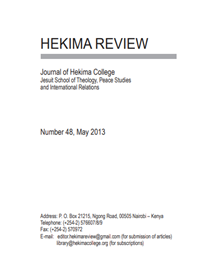Constitutional Power-sharing Democracy in Africa: the Concept of Power-sharing in the Emergence of Coalition Governments in Africa – a Critical analysis of Kenya’s Case
Keywords:
Democracy, Africa, Governance, KenyaAbstract
One can read Oburu’s book in one sitting and get a lot from it, the more reason I recommend it to readers. The book is timely, coming out as it does at a critical transitional moment in Kenya’s political history. The author’s main thesis is that, in the multi-ethnic nation-states of Africa, power-sharing could be “a step towards debunking the perception that political positions are a gateway to wealth, but rather a platform for development of all regions in a state” (p. 2). However, for power-sharing to deliver as suggested, it would have to be enshrined in credible constitutions and supported by trusted constitutionalism. That way, the creation of political grand-coalitions will no longer become mere gentleman’s and gentlewoman’s agreement between disgruntled élites bent on causing havoc unless appeased by a share of the proverbial “national cake”. Moreover, the author argues, constitutionally instituted coalitions would come close to traditional African consensual democracy, and even closer to Arend Li-jphart’s consorciational democracy. Thus will the ills of “winner-takes-all” majoritarian democracy be reversed, especially its tendency to reduce losers to a resentful, empty-handed minority whose “turn to eat” has been unfairly pushed forward yet again.
Downloads
Downloads
Published
Issue
Section
License
Copyright (c) 2024 Hekima Review

This work is licensed under a Creative Commons Attribution-ShareAlike 4.0 International License.


